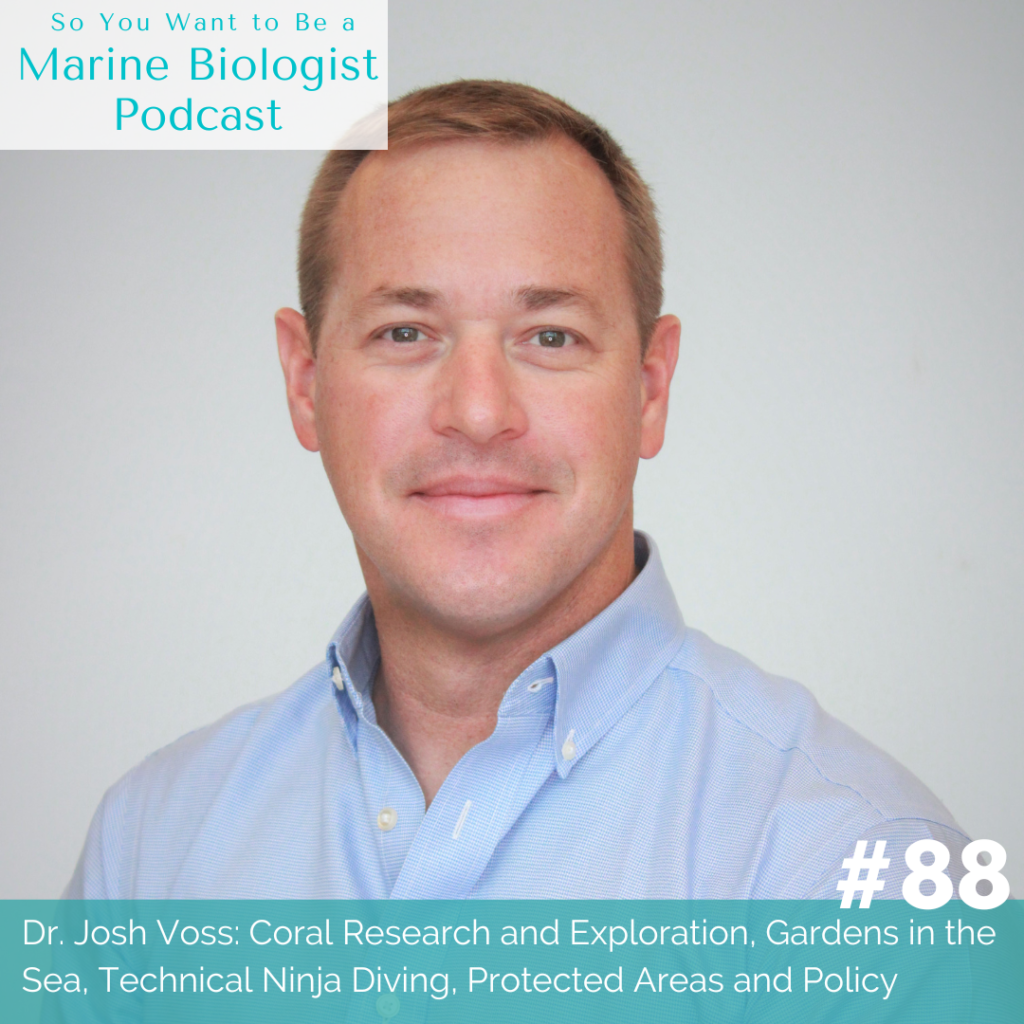Dr. Joshua Voss is the Executive Director of NOAA’s Cooperative Institute for Ocean Exploration, Research, and Technology and an Associate Research Professor at Florida Atlantic University’s Harbor Branch Oceanographic Institute. His primary areas of interest include shallow and mesophotic coral reef ecology, coral health and disease, molecular ecology, marine conservation and management. Through Harbor Branch’s Robertson Coral Reef Program and CIOERT he works to discover, characterize, and protect coral reefs ecosystems. Voss is a certified technical rebreather diver and scuba instructor who has completed over 1500 scientific dives and led more than 35 scientific expeditions primarily in the Bahamas, Florida Keys, Dry Tortugas, Belize, Cuba, and Gulf of Mexico with additional investigations in Panama, Curacao, Bonaire, Dominica, USVI, and St. Eustatius. Voss teaches undergraduate courses in the Harbor Branch Semester by the Sea Program and Florida Institute of Oceanography marine field studies program, graduate courses in FAU’s Department of Biology, and molecular workshops for high school students. He has also served on various committees including the South Atlantic Fisheries Management Council Coral Advisory Panel, Southeast Florida Coral Reef Initiative Team and as co-lead of their Technical Advisory Committee, the Florida Keys National Marine Sanctuary Technical Advisory Committee, the South Florida Marine Research Hub, and FAU’s Diving and Boating Safety Committee. After growing in central Florida, Voss attended Elon University in North Carolina and completed a B.S. in Biology along with minors in Philosophy and Chemistry. He earned his Ph.D. in Biological Sciences at Florida International University in Miami, and was a member of the Marine Science faculty at Eckerd College in St. Petersburg before joining FAU Harbor Branch.
This episode is brought to you by Florida Atlantic University’s Harbor Branch Oceanographic Institute. For over 50 years, FAU Harbor Branch has been in relentless pursuit of Ocean Science for a Better World®. Located in Fort Pierce, Florida, FAU Harbor Branch’s cutting-edge research focuses on marine ecosystem conservation, aquaculture, the connection between ocean and human health, and technological innovation and national defense. During my time as part of the undergraduate Semester By the Sea program, I learned so much about the ocean and what it takes to become a good scientist. The programs and opportunities offered at FAU Harbor Branch have continued to swell since! To learn more, and how you can get involved, please visit www.fau.edu/hboi.
Connect with Josh: website
Quick Links
Harbor Branch Oceanographic Institute- Semester by the Sea
Flower Garden Banks National Marine Sanctuary
ROV
UNCW
Amy Wright FAU
Stony Coral Tissue Loss Disease
Elon University of North Carolina
Perry Institute for Marine Science
FIU Laurie Richardson
Coral Disease
Florida Keys National Marine Sanctuary
Kristin Jacobs Coral Ecosystem Conservation Area
Oculina Reef
Sea Cucumber
Ocean Discovery Visitors Center
Josh Voss Lab
Harbor Branch Summer Internship Programs
Show Notes
0:23 Josh starts by introducing the Flower Garden Banks National Marine Sanctuary. He shares about the incredible deep water coral reefs and what doing research in this area looks like using ROV’s and special deep water diving techniques.
9:04 There are so many reasons why coral reefs are so to us. Josh explains the incredible ecosystem functions that corals provide as well as their role in supporting fish communities, creating habitats, providing wave protection from hurricanes, and boosting the tourism industry. Aesthetics, biological services, and physical protection are all involved.
12:05 What does a healthy reef look like? The answer is dependent on the reef! Josh explains that reef health is usually measured in terms of relative changes overtime in species abundance, disease, coral cover etc.
15:43 Josh talks about his roots in marine science. He shares that he became fascinated by science from a young age thanks to an 8th grade teacher and decided to focus on coral diseases through connecting his interest with pathology to a marine context.
19:33 From a pHD about coral disease in 2006 to still working on coral disease today, Josh talks about how technology have changed, specifically with molecular and micro biology to improve methods and efficiency for coral research.
24:00 Josh describes the key signs of what stony coral tissue disease looks like on the reefs, what is known about it, what species it affects, and what is still unknown.
29:45 Josh talks about what reef management looks like at different levels and speaks on the importance of national marine sanctuaries. He also emphasizes the need for public engagement to protect coral reef habitats within management.
40:00 There are some species of coral that live in both shallow and deep water. Josh tells us more about how some species survive these different environments and how it was discovered.
44:08 Reef health is determined by many different factors like pollution, coastal impacts, and fishing. Josh explains some reasons why mesophotic reefs are generally healthier than shallow reefs and how connectivity of these healthy reefs could aid in shallow reef recovery.
48:21 Josh’s favorite sea creatures are sea cucumbers for their diverse life histories!
49:07 What does the ocean mean to Josh- two different things personally and professionally.
50:03 Josh brings up a fantastic point about bridging the gap and talking about ocean issues. It is important to speak up, not be afraid of conflict, and stop the topic from being a taboo.
51:48 With a blank check Josh would continue to fund projects that seek out new reef habitats and protect them.
52:45 The heartwarming field story of Josh meeting his wife.
54:00 Josh’s conservation ask!
55:28 Connect with Josh!
